Hagakure - The Book Of The Samurai

Introduction
Hagakure by Yamamoto Tsunetomo
(Kyujitai or Shinjitai: meaning In the Shadow of Leaves)
Tsuramoto Tashiro compiled these commentaries from his conversations with Tsunetomo from 1709 to 1716; however, it was not published until many years afterwards. Hagakure is also known as the The Book of the Samurai, Analects of Nabeshima or the Hagakure Analects.
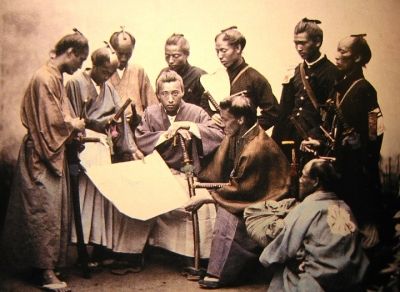
Among the Maxims on Lord Naoshige's wall there was this one..
“ Matters of great concern should be treated lightly.' Master lttei commented: Matters of small concern should be treated seriously”..
The book records Tsunetomo's views on bushido, the warrior code of the samurai. Hagakure is sometimes said to assert that bushido is really the "Way of Dying" or living as though one was already dead, and that a samurai retainer must be willing to die at any moment in order to be true to his lord.
After his master died, Tsunetomo himself was forbidden to perform tsuifuku, a retainer's ritual suicide, by an edict of the Tokugawa Shogunate. Hagakure may have been written partially in an effort to outline the role of the samurai in a more peaceful society. Several sections refer to the "old days", and imply a dangerous weakening of the samurai class since that time.
The Hagakure was written approximately one hundred years after the start of the Tokugawa era, a time of relative peace. With no major campaigns to fight the samurai were transforming from a warrior to an administrative class. His work represents one approach to the problem of maintaining military preparedness and a proper military mindset in a time when neither has much practical application.
Hagakure: The Book of the Samurai
From the 1st Chapter..
"..if someone were to ask, "What is the true meaning of the Way of the Samurai?" The person who would be able to answer promptly is rare..The Way of the Samurai is found in death."
" When it comes to either/or, there is only the quick choice of death. It is not particularly difficult. Be determined and advance. To say that dying without reaching one's aim is to die a dog's death is the frivolous way of sophisticates. When pressed with the choice of life or death, it is not necessary to gain one's aim.
We all want to live. And in large part we make our logic according to what we like. But not having attained our aim and continuing to live is cowardice. This is a thin dangerous line. To die without gaming one's aim is a dog's death and fanaticism. But there is no shame in this. This is the substance of the Way of the Samurai. If by setting one's heart right every morning and evening, one is able to live as though his body were already dead, he pains freedom in the Way. His whole life will be without blame, and he will succeed in his calling."
"..Loyalty is said to be important in the pledge between lord and retainer. Though it may seem unobtainable, it is right before your eyes. If you once set yourself to it, you will become a superb retainer at that very moment.."
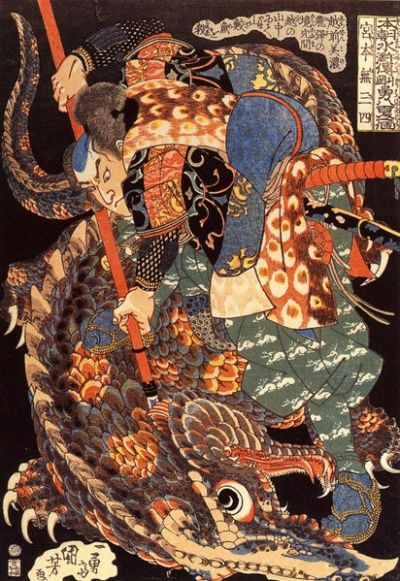
From the 2nd Chapter..
"A certain priest said that if one thoughtlessly crosses a river of unknown depths and shallows, he will die in its currents without ever reaching the other side or finishing his business. This is the same as when one is indiscriminately eager in being a retainer without understanding the customs of the times or the likes and dislikes of the master and, as a result, is of no use and brings ruin upon himself. To try to enter the good graces of the master is unbecoming. One should consider first stepping back and getting some understanding of the depths and shallows and then work without doing anything the master dislikes."
"Our bodies are given life from the midst of nothingness. Existing where there is nothing is the meaning of the phrase, "Form is emptiness." That all things are provided for by nothingness is the meaning of the phrase, "Emptiness is form."' One should not think that these are two separate things.. "
"Even if one's head were to be suddenly cut off, he should be able to do one more action with certainty. The last moments of Nitta Yoshisada are proof of this . Had his spirit been weak, he would have fallen the moment his head was severed. Recently, there is the example of Ono Doken. These actions occurred because of simple determination. With martial valor, if one becomes like a revengeful ghost and shows great determination, though his head is cut off, he should not die.. "
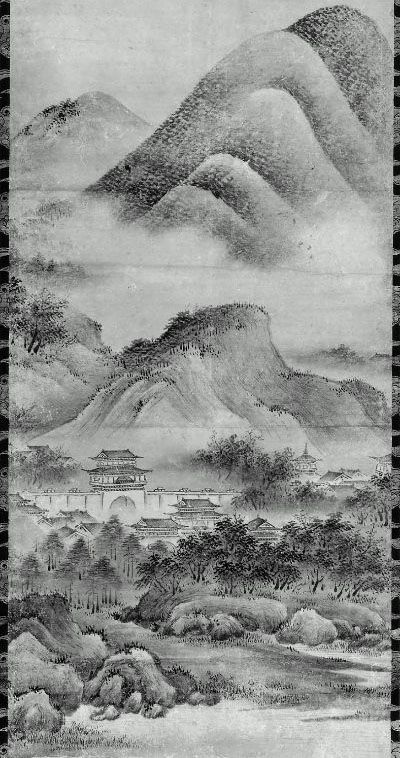
From the 3rd Chapter..
""There is nothing felt quite so deeply as giri. There are times when someone like a cousin dies and it is not a matter of shedding tears. But we may hear of someone who lived fifty or a hundred years ago, of whom we know nothing and who has no family ties with us whatsoever, and yet from a sense giri shed tears." "
"When Lord Naoshige was passing by a place called Chiriku, someone said to him, ' 'In this place there lives a man who is over ninety years old. Since this man is so fortunate, why don't you stop and see him?" Naoshige heard this and said, "How could anyone be more pitiful than this man? How many of his children and grandchildren do you suppose he has seen fall before his very eyes? Where is the good fortune in that?"
It seems that he did not stop to see the man"
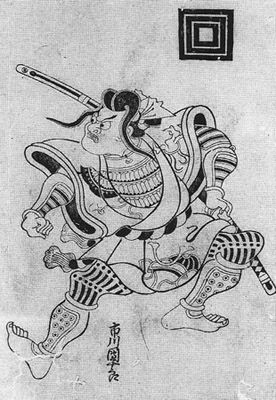
From the 4th Chapter..
"When Lord Katsushige was young, he was instructed by his father, Lord Naoshige, "For practice in cutting, execute some men who have been condemned to death." Thus, in the place that is now within the western gate, ten men were lined up, and Katsushige continued to decapitate one after another until he had executed nine of them. When he came to the tenth, he saw that the man was young and healthy and said, "I'm tired of cutting now. I'll spare this man's life." And the man's life was saved"
"Lord Katsushige always used to say that there are four kinds of retainers. They are the "quick, then lagging," the "lagging, then quick," the "continually quick," and the ''continually lagging.''
The "continually quick" are men who when given orders will undertake their execution quickly and settle the matter well. Fukuchi Kichizaemon and the like resemble this type.
The "lagging, then quick" are men who, though lacking in understanding when given orders, prepare quickly and bring the matter to a conclusion. I suppose that Nakano Kazuma and men similar are like this.
The "quick, then lagging" are men who when given orders seem to be going to settle things but in their preparation take time and procrastinate. There are many people like this.
Other than these, one could say that the rest are ''continually lagging."
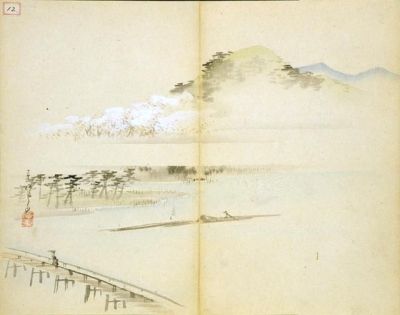
From the 5th Chapter..
There is no 5th Chapter?..I love querks like that! :-)
From the 6th Chapter..
"When Lord Takanobu was at the Battle of Bungo, a messenger came from the enemy camp bearing sake and food. Takanobu wanted to partake of this quickly, but the men at his side stopped him, saying, "Presents from the enemy are likely to be poisoned. This is not something that a general should eat."
Takanobu heard them out and then said, "Even if it is poisoned, how much of an effect would that have on things? Call the messenger here!" He then broke open the barrel right in front of the messenger, drank three large cups of sake, offered the messenger one too, gave him a reply, and sent him back to his camp. Takagi Akifusa turned against the Ryuzoji clan, appealed to Maeda Iyo no kami Iesada, and was sheltered by him. Akifusa was a warrior of matchless valor and was an accomplished and agile swordsman. His retainers were Ingazaemon and Fudozaemon, stalwarts in no way inferior, and they left Akifusa's side neither day nor night. Thus it happened that a request was sent from Lord Takanobu to Iesada to kill Akifusa. At one point, when Akifusa was seated on the veranda having Ingazaemon wash his feet, Iesada came running up behind him and struck off his head, Before his head fell, Akifusa drew out his short sword and turned to strike, but cut off Ingazaemon's head. The two heads fell into the wash basin together. Akifusa's head then rose into the midst of those present. This was the sort of magic technique that he consistently had. "
"Even when the children in his family were very young, Yamamoto Jin'emon would draw near to them and say, "Grow up to be a great stalwart, and be of good use to your master." He said, "It is good to breathe these things into their ears even when they are too young to understand.""
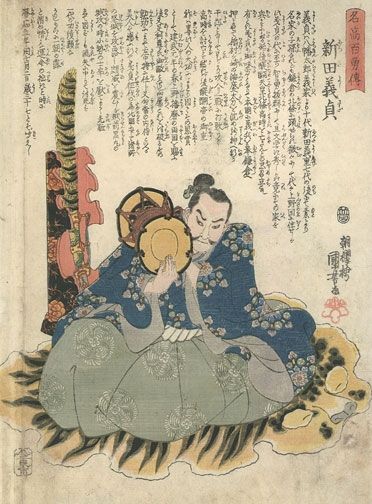
From the 7th Chapter..
"Narutomi Hyogo said, "What is called winning is defeaing one's allies. Defeating one's allies is defeating oneself, and defeating oneself is vigorously overcoming one's own body.
"It is as though a man were in the midst of ten thousand allies but not a one were following him. If one hasn't previously mastered his mind and body, he will not defeat the enemy."
"In the generation of Lord Mitsushige, Oishi Kosuke was at first a foot soldier serving at the side of his master. Whenever Lord Mitsushige was making the trip for his alternate- year residence in Edo, Kosuke would make the rounds around the sleeping quarters of his master, and if he thought a certain area to be insecure, he would spread a straw mat and pass through the night awake by himself. In rainy weather he would simply wear a bamboo hat and an oilpaper raincoat and would stand watch while being pelted by the rain. It is said that to the end he never spent a single night in negligence ."
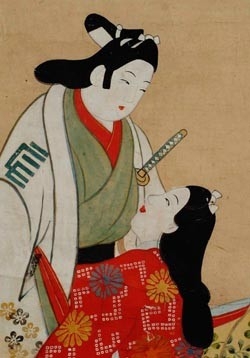
From the 8th Chapter..
"Once when a number of men had gathered on the platform of the inner citadel of the castle, a certain man said to Uchida Shouemon, "It is said that you are a teacher of the sword, but judging by your everyday attitude, your teaching must be very wild indeed. If you were requested to perform kaishaku, I can imagine that instead of cutting the neck you'd probably cut the top of the man's head .''
Shouemon rejoined, "Such is not the case. Draw a little ink spot on your own neck, and I'll show you that I can cut without being off by a hair." "
"A man who had cut off fifty heads once said, "According to the head, there are cases when even the trunk of a body will bring some reaction to you. Cutting off just three heads, at first there is no reaction and you can cut well. But when you pet to four or five, you feel quite a bit of reaction. At any rate , since this is a very important matter, if one always plans on bringing the head to the ground there should be no mistakes.""
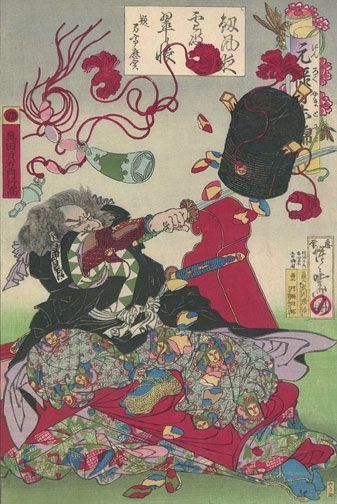
From the 9th Chapter..
"When Shimomura Shoun was on service at the castle, Lord Naoshige said, "How wonderful it is that Katsushige is so vigorous and powerful for his age. In wrestling with his peers he even beat those who are older than he is."
Shoun replied, "Even though I'm an old man, I'll bet I'm best at seated wrestling." So saying, he jerked up Katsushige and threw him so forcefully that it hurt. He then said, "To be prideful about your strength while your mettle is not yet established is likely to bring you shame in the midst of people. You are weaker than you look.'' Then he withdrew."
"When Yamamoto Jin'emon was eighty years old, he became ill. At one point, he seemed to be on the verge of groaning, and someone said to him, "You'll feel better if you groan. Go ahead. But he replied, "Such is not the case. The name of Yamamoto Jin'emon is known by everyone, and I have shown up well throughout a whole lifetime. To let people hear my groaning voice in my last moments would never do." It is said that he did not let out a groan to the very end"
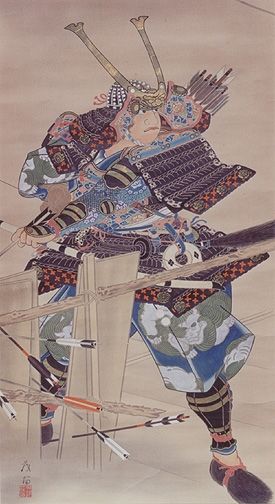
From the 10th Chapter..
"When faced with a crisis, if one puts some spittle on his earlobe and exhales deeply through his nose, he will overcome anything at hand. This is a secret matter. Furthermore, when experiencing a rush of blood to the head, if one puts spittle on the upper part of one's ear, it will soon go away."
"There is nothing that surpasses ruling with benevolence. However, to put into practice enough benevolent governing to rule the country is difficult. To do this lukewarmly will result in neglect. If governing with benevolence is difficult, then it is best to govern strictly. To govern strictly means to be strict before things have arisen, and to do things in such a way that evil will not arise. To be strict after the evil has arisen is like laying a snare. There are few people who will make mistakes with fire after having once been burned. Of people who regard water lightly, many have been drowned."
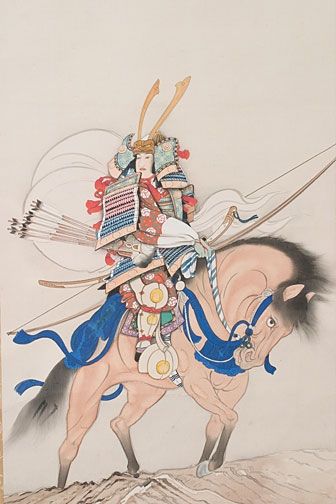
From the 11th Chapter..
"A person who does not want to be struck by the enemy s arrows will have no divine protection. For a man who does not wish to be hit by the arrows of a common soldier, but rather by those of a warrior of fame, there will be the protection for which he has asked"
"There is something to which every young samurai should pay attention. During times of peace when listening to stories of battle, one should never say, "In facing such a situation, what would a person do?" Such words are out of the question. How will a man who has doubts even in his own room achieve anything on the battlefield? There is a saying that goes, "No matter what the circumstances might be, one should be of the mind to win. One should be holding the first spear to strike." Even though you have put your life on the line, there is nothing to be done when the situation doesn't go as planned."
"These are teachings of Yamamoto Jin'emon:
Singlemindedness is all-powerful.
Tether even a roasted chicken.
Continue to spur a running horse.
A man who will criticize you openly carries no connivance .
A man exists for a generation, but his name lasts to the end of time.
Money is a thing that will be there when asked for. A good man is not so easily found.
Walk with a real man one hundred yards and he'll tell you at least seven lies.
To ask when you already know is politeness. To ask when you don't know is the rule.
Wrap your intentions in needles of pine.
One should not open his mouth wide or yawn in front of another. Do this behind your fan or sleeve.
A straw hat or helmet should be worn tilled toward the front. "
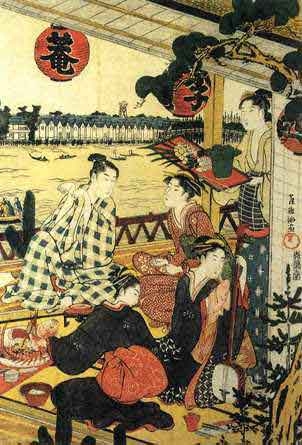
"As a retainer of the Nabeshima clan, one should have the intention of studying our province's history and traditions, but provincial studies are made light of nowadays. The basic reason for this study is to understand the foundation of our clan, and to know that the clan's forefathers established its perpetuity by means of their suffering and compassion. The fact that our clan has perpetually continued in an unrivaled manner up to this very day is due to the humanity and martial valor of Master Ryuzoji Iekane, the charity and faith of Master Nabeshima Kiyohisa, and the appearance of Lord Ryuzoji Takanobu and Lord Nabeshima Naoshige and their might.
I am at a complete loss when it comes to understanding why people of this generation have forgotten these things and respect the Buddhas of other places. Neither the Shakyamuni Buddha, nor Confucius, nor Kusunoki, nor Shingen were ever retainers of the Ryuzojis or the Nabeshimas; hence it cannot be said that they are in harmony with our clan's customs. In times of war or in times of peace it would be sufficient if both the upper and lower classes would worship our ancestors and study their teachings. One worships the head of whatever clan or discipline to which he belongs. Outside learning for retainers of our clan is worthless. One may think that it is fine to study other disciplines as a diversion after his provincial studies are replete. Yet if a person has a good understanding of provincial studies, he will see that there is nothing lacking in them.
Today, if someone from another clan were to ask about the origin of the Ryuzojis and the Nabeshimas, or why the fief was transferred from the former to the latter, or if they were to ask something like, "I have heard that the Ryuzojis and the Nabeshimas are the greatest in Kyushu for deeds of martial valor, but can you tell me some of the particulars?" I suppose that the man with no knowledge of provincial studies would not be able to answer a word.
For a retainer there should be nothing other than doing his own job. For the most part people dislike their own jobs, find those of others more interesting, cause misunderstanding, and bring on utter disasters. Good models of men who performed their duty in their work are Lord Naoshige and Lord Katsushige. The retainers of those times all performed their duties. From the upper classes, men who would be of good use were searched out, while from the lower classes men desired to be useful. The minds of the two classes were of mutual accord , and the strength of the clan was secure.
In all our generations of masters there has never been a bad or foolish one, and in the end there has never been one who ranked second or third among the daimyo of Japan. It is truly a wonderful clan; this is due to the faith of its founders. Moreover, they did not send the clan's retainers to other provinces. nor did they invite men from other provinces in. Men who were made ronin were kept within the province, as were the descendants of those who were made to commit seppuku. The wonder of being born into a clan with such a deep pledge between master and servant is an inexpressible blessing, passed down through the apes, for both farmer and townsman. This goes without saying for the retainer .
The foundation of a Nabeshima samurai should be in knowing this fact; in being deeply resolved to return this blessing by being useful ; in serving more and more selflessly when treated kindly by the master ; in knowing that being made a ronin or being ordered to commit seppuku are also forms of service ; and in aiming to be mindful of the clan forever, whether one is banished deep in the mountains or buried under the earth. Although it is unfitting for someone like me to say this, in dying it is my hope not to become a Buddha. Rather, my will is permeated with the resolution to help manage the affairs of the province, though I be reborn as a Nabeshima samurai seven times. One needs neither vitality nor talent. In a word, it is a matter of having the will to shoulder the clan by oneself.
How can one human being be inferior to another? In all matters of discipline, one will be useless unless he has great pride. Unless one is determined to move the clan by himself, all his discipline will come to naught. Although, like a tea kettle, it is easy for one's enthusiasm to cool, there is a way to keep this from happening. My own vows are the following :
Never to be outdone in the Way of the Samurai.
To be of good use to the master.
To be filial to my parents.
To manifest great compassion, and to act for the sake of Man.
If one dedicates these four vows to the gods and Buddhas every morning, he will have the strength of two men and will never slip backward. One must edge forward like the inchworrn, bit by bit. The gods and Buddhas, too, first started with a vow. "
Yamamoto Tsunetomo
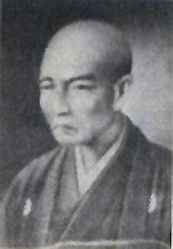
The Author..
Yamamoto Tsunetomo was a samurai who took the tonsure in 1700 and retired to a hermitage near Saga Castle in Kyushu. This was brought about by his not being able to follow his lord, Nabeshima Mitsushige,in death, for this practice had been prohibited in the 1660's by both the Nabeshima fief and the Tokugawa shogunate. Though he had interest in Poetry from an early age, he is not known for any literary works other than Hagakure. And though a samurai, he never engaged in warfare. The actual writing down of this book was done by a youngster samurai, who made visits to talk with Yamamoto over a period of seven years.
The Book was translated into English by William Scott Wilson.






